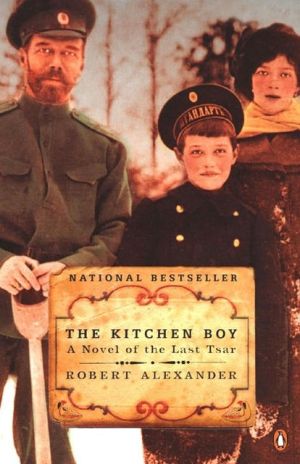The Kitchen Boy: A Novel of the Last Tsar
Drawing from decades of work, travel, and research in Russia, Robert Alexander re-creates the tragic, perennially fascinating story of the final days of Nicholas and Alexandra as seen through the eyes of the Romanovs’ young kitchen boy, Leonka. Now an ancient Russian immigrant, Leonka claims to be the last living witness to the Romanovs’ brutal murders and sets down the dark secrets of his past with the imperial family. Does he hold the key to the many questions surrounding the family’s...
Search in google:
Drawing from decades of work, travel, and research in Russia, Robert Alexander re-creates the tragic, perennially fascinating story of the final days of Russian monarchs Nicholas and Alexandra as seen through the eyes of the Romanov's young kitchen boy, Leonka.BookPage Review In the turbulent early days of revolutionary Russia, Bolshevik agents herded the deposed Tsar Nicholai II, his family and aides into the basement of a Siberian house and executed them all in a blaze of gunfire. Details of what happened that fateful night have taken decades to emerge, reaching a terrible climax with the 1991 excavation of a mass grave believed to be the one in which some of the members of the Romanov family were buried. Writer Robert Alexander, a fluent Russian speaker who studied in Leningrad, became fascinated with an obscure reference in the Empress Alexandra's personal journal shortly before her death, noting that their kitchen boy had been sent away. This brief reference from a forgotten 1918 diary took root in Alexander's imagination and, after much research, blossomed as his new novel The Kitchen Boy. This intriguing work of speculative historical fiction re-creates the last days of the tsar through the eyes of the young Leonka, who recalls how he secretly returned to the Siberian house that served as the Romanovs' prison and witnessed their execution. The novel successfully maintains an intense atmo-sphere of peril and suspense despite the reader's foreknowledge of the Romanovs' fate. The calamity is heightened by the fierce, almost primal protectiveness the parents showed toward their children-who nevertheless would die with them-invoking compassion for the royal family as people rather than dusty national symbols. Despite the sympathetic portrayal of the tsar and his family, Alexander doesn't ignore the judgment of history. As Leonka notes, however well-intentioned Nicholai and his empress may have been, their rule over Russia was a legacy of war, revolution, corruption and oppression. But the thuggish Bolshevik revolutionaries fare no better under the novel's scrutiny. The Kitchen Boy is a fascinating and suspenseful glimpse of a tempestuous but shadowy period in Russian history. It's also a moving portrait of a family that, despite their legendary role in world events, proved in the end to be as mortal as the rest of us. Gregory Harris is a writer, editor and technology consultant in Indianapolis.
"My name is Mikhail Semyonov. I live in Lake Forest village, Illinois state, the United States of America. I am ninety-four years old. I was born in Russia before the revolution. I was born in Tula province and my name then was not Mikhail or even Misha, as I am known here in America. No, my real name-the one given to me at birth-was Leonid Sednyov, and I was known as Leonka. Please forgive my years of lies, but now I tell you the truth. What I wish to confess is that I was the kitchen boy in the Ipatiev House where the Tsar and Tsaritsa, Nikolai and Aleksandra, were imprisoned. This was in Siberia. And...and the night they were executed I was sent away. They sent me away, but I snuck back, and that night, the moonless night of July 16-17, 1918, I saw the Tsar and his family come down the back twenty-three steps of the Ipatiev House, I saw them go into that cellar room...and I saw them shot. Trust me, believe me, when I say this: I am the last living witness and I alone know what really happened that awful night...just as I alone know where the bodies of the two missing children are to be found. You see, I took care of them with my own hands."\ Misha took a deep breath, tried to push himself on, but couldn't. Panicking, he hit the stop button on his tape recorder, and just sat there on the flagstone terrace of his home, his eyes fixed straight ahead on the curling waters of Lake Michigan. Despite his determination, he'd faltered, been unable to proceed.\ Over the many years since the Russian Revolution, Misha had come to realize that on a single night in 1918 he had witnessed far too much for an entire lifetime, particularly in the tortured silence he had so sternly observed in the ensuing decades. But such was his punishment. He was an old man, certain that this long life and clear memory were the torture he deserved. Yes, there was a God, for if there were not he would have been spared this suffering. Instead he kept on living. And remembering. True, he had gained some wisdom, for over the course of all this time he had come to look at that night as the start of everything horrible that had since befallen his poor Rossiya. As he looked back from these United States and through the distance of the decades, it was all so clear. A great curse was unleashed that night, inundating every corner of his vast homeland. If his comrades could commit such an act, was it any wonder that Stalin could kill upward of twenty million of his own people? No, of course not. On a hot night in the Siberian city of Yekaterinburg the individual had become expendable.\ Misha was a tall man who walked with the slightest of limps, but over the last fifteen years, of course, he had grown smaller and his gait more halting as his body had settled and lost muscle mass. He'd always been trim, and it was this leanness that had undoubtedly contributed to his longevity and his lack of major illness. His hair, which he had always combed straight back in an elegant manner, had been snow white for more than thirty years, and while it had receded only slightly, it had definitely thinned. His face was narrow and long, his nose simply narrow, while his upper lip was straight and noticeably, almost oddly, small. Since his fifties, the tone of his skin had gone from robust to ruddy to its present parchment color, skin that now hung loosely from his sharp cheekbones. Always a dapper dresser, he wore lightweight gray wool pants and a yellow cashmere sweater over a pressed and starched blue shirt from Brooks Brothers.\ Seated in a wrought iron chair on the raised terrace behind his grand, twenty-room house, he stared out over the bluff and at the lake, himself the very image of old Chicago money. Nothing, however, could have been further from the truth, for when he'd arrived in the United States in 1920 he'd had but a rucksack, one suitcase, and the clothes he was wearing. And while everyone believed that he'd made his millions on the stock market down at the Chicago Board of Trade, that too was a lie, albeit one that he had carefully cultivated.\ Staring out at Lake Michigan, Misha was transfixed by the flashes of light upon the blue water, flashes that sparkled like diamonds. He'd been tormented his entire life because of that night more than eighty years ago, a night which until now he'd never spoken of to anyone except May, his beloved wife. But now he must, now he had no choice. May was already two weeks in the grave, and he was determined to follow her as soon as possible. Before he left this world, however, he had certain obligations, namely, to reveal a kind of truth to their only heir, their lovely granddaughter, Kate. May, who'd also fled Russia after the revolution, fully understood the delicacy of the matter, and even though she'd helped Misha decide just how it might be done, he'd put it off. Now, however, the time had come, he could wait no more: he must give the young woman not simply a way to understand, but a reason to fulfill a pledge he had made so long ago. No, he thought, he had to give her more than a reason. He had to set her on a mission, his mission, otherwise he feared she might flounder in confusion, even despair, and perhaps thereby stumble upon...upon...No, thought Misha, he couldn't let that happen.\ He raised his wrist and checked his thick, gold watch, which these days hung so loosely on his thin wrist. It was teatime. And if May were still alive, he would be joining her upstairs. Their maid would bring up a pot of tea, Misha and May would each have exactly two cups, a biscuit or two, and May, who'd been bedridden for the past three years, would reminisce about Russia, as she had done so frequently in her last years, chatting about this and that, but...but...well, she was gone. All that was over. And now Misha needed to take care of this as soon as possible.\ Clutching the tape recorder in one of his thin hands, with the other he grabbed the arm of the wrought iron chair and pulled himself forward. With no small amount of effort, he pushed himself to his feet. And then he simply stood there, swaying like a flag in a gentle breeze. Once he'd gained his balance, he started across the flagstones, one hesitant step at a time. At the house, he pulled open one of the French doors, lifted up his foot, focused all his attention on the effort, then stepped into the grand central hallway, a gallery of sorts, that ran from the front to the back of the house. The living room lay immediately to his right, and he carefully made his way into this grand room with its dark-beamed ceiling and matching woodwork. At the far end stood the focal point, the large, stone fireplace amputated from some French château, while a palace-sized Oriental carpet in deep reds and blues ran from one end to the other.\ As he moved slowly through the room, Misha wondered what his granddaughter was going to do with it all, these antiques, the oil paintings, the Tiffany sterling and Steuben crystal bric-a-brac that May and he had collected over the decades. Perhaps she and her husband would keep everything, perhaps they would sell it all. He didn't much care, these common things didn't matter. However, the numerous Fabergé items-including the little jade bulldog with the diamond eyes that sat on the coffee table and the cobalt blue enamel opera glasses of the Tsaritsa's sister perched over there on the piano-were an entirely different matter. He'd left detailed instructions in his will, and he prayed Kate would follow his precise instructions. If only his story would induce her to do just that.\ On the far side of the living room Misha moved through an arched opening and into his library that was filled with two red leather chairs, a large desk, and a massive built-in walnut bookcase that held his entire collection of books on the Russian royal family. Focused on the task at hand, he went directly to his desk and put down the small black tape recorder, laying it next to a manila folder-his dossier-which contained a variety of historical documents. Sure, a thousand truths, that was what it was going to take to convince his Katya, daughter of his son, which was precisely why he'd carefully collected copies of letters and diary entries and telegrams from that time. And he would not only read from these, but leave the complete dossier for her to peruse, even scrutinize.\ Wasting no time, he sat down, opened the top desk drawer, and withdrew a sheet of letterhead. He then took a gold ink pen, and wrote:\ August 27, 1998\ My Dearest Katya,\ This tape and these documents are for you. Perhaps together they will help you understand the complete picture. Please forgive me. Yours forever with love and devotion,\ Dyedushka Misha\ Satisfied, he laid aside the pen and paper. And now he had no choice but to continue, to press on to the end. He reached for the small tape recorder, held the microphone to his dry lips, turned the machine back on, and slid into the past.\ "Yes, so as I was saying, my sweet one, I know what happened that horrible night the Romanovs were murdered. But the truth of the matter is that the beginning of the end of my Nikolai and Aleksandra commenced a few weeks earlier, which is to say I'll never forget the twentieth of June, 1918, the day we received the first of the secret notes."
\ BookPage ReviewIn the turbulent early days of revolutionary Russia, Bolshevik agents herded\ the deposed Tsar Nicholai II, his family and aides into the basement of a\ Siberian house and executed them all in a blaze of gunfire. Details of what\ happened that fateful night have taken decades to emerge, reaching a\ terrible climax with the 1991 excavation of a mass grave believed to be the\ one in which some of the members of the Romanov family were buried.\ Writer Robert Alexander, a fluent Russian speaker who studied in Leningrad,\ became fascinated with an obscure reference in the Empress Alexandra's\ personal journal shortly before her death, noting that their kitchen boy had\ been sent away. This brief reference from a forgotten 1918 diary took root\ in Alexander's imagination and, after much research, blossomed as his new\ novel The Kitchen Boy. This intriguing work of speculative historical\ fiction re-creates the last days of the tsar through the eyes of the young\ Leonka, who recalls how he secretly returned to the Siberian house that\ served as the Romanovs' prison and witnessed their execution.\ The novel successfully maintains an intense atmo-sphere of peril and\ suspense despite the reader's foreknowledge of the Romanovs' fate. The\ calamity is heightened by the fierce, almost primal protectiveness the\ parents showed toward their children—who nevertheless would die with\ them—invoking compassion for the royal family as people rather than dusty\ national symbols.\ Despite the sympathetic portrayal of the tsar and his family, Alexander\ doesn't ignore the judgment of history. As Leonka notes, however\ well-intentioned Nicholai and his empress may have been, their rule over\ Russia was a legacy of war, revolution, corruption and oppression. But the\ thuggish Bolshevik revolutionaries fare no better under the novel's\ scrutiny.\ The Kitchen Boy is a fascinating and suspenseful glimpse of a tempestuous\ but shadowy period in Russian history. It's also a moving portrait of a\ family that, despite their legendary role in world events, proved in the end\ to be as mortal as the rest of us.\ Gregory Harris is a writer, editor and technology consultant in\ Indianapolis.\ \ \ \ \ \ \ Publishers WeeklyThe Romanovs are arguably second only to Jack the Ripper as objects of literary speculation. The story of their last days, their possible escape and the final resting place of the $500 million in jewels hidden in their clothing provides periodic grist for fiction writers. Alexander's first novel is based on "decades of painstaking research" and access to previously sealed Russian archives. He has produced a detailed version of the Romanovs' captivity, but the book fails to deliver much drama, despite the inherent mystery of the events. Narrated by 94-year-old Mikhail Semyanov, a Russian immigrant now living outside Chicago, the novel travels back to the bloody days of the Russian revolution, when the entire royal family is imprisoned in Siberia, in a building known as the House of Special Purpose. There, the seven Romanovs-Tsar Nikolai, his wife Aleksandra, their hemophiliac son, Aleksei, and their four daughters-are confined with a small staff of attendants, including Leonka, the kitchen boy of the title, who may or may not be narrator Mikhail. The captivity is seen from Leonka's point of view, and his focus on the gravely ill Aleksei prevents the development of a fully nuanced portrait of the rest of the family. Instead, they're depicted as passive victims of a tyranny even worse than the czarist state. Though impressively detailed, the novel is often as static as a museum exhibit, with notes and documents held up for display. Most of the suspense is held for the end, a denouement that reveals Mikhail's identity and Alexander's imaginative theory about the final dispensation of the Romanov jewels. . (Copyright 2002 Cahners Business Information.\ \ \ Library JournalDrawing on 30 years of research and archival source documents, first novelist Alexander transforms a now-familiar and bloody era of history-the Bolshevik Revolution and the Romanov massacre-into a suspenseful and richly layered account of a family in deadly peril. The story is told from the viewpoint of a surviving witness, the kitchen boy who worked in the house where the Romanovs were imprisoned in 1918. Now an ailing grandfather, Misha records his experiences on tape so that his American granddaughter will know his real history. Tsar Nicholas and his wife, Alexandra, are portrayed as loving but achingly flawed people whose poor judgments lead inexorably to the family's destruction. The Bolsheviks, on the other hand, come off as comic book villains. Because the fate of two Romanov children, Alexei and Marie, is still not known (their bodies were missing from the family's gravesite when it was exhumed in 1991), Alexander's version of what might have befallen them packs a wallop that is surprising but consistent with his story. Sure to entrance readers in most public libraries, this is recommended for most historical fiction collections.-Barbara Conaty, Library of Congress Copyright 2003 Cahners Business Information.\ \ \ \ \ Kirkus ReviewsOnce again, the end of the Romanovs by execution, this time through the memories of an old man who claims he was there. In 1998, in a Chicago suburb, a wealthy aging Russian émigré bequeaths to his granddaughter a tape he’s made so that she will understand his role in the death of the Tsar and his family. According to the tape, he was a 14-year-old kitchen boy called Leonka in the Siberian house where the Romanovs were imprisoned. The narrator waxes on about the Tsar and Tsarina’s qualities as human beings—their courage, kindness, family devotion—while he begrudgingly acknowledges their weakness as rulers: Alexandra’s religious fanaticism and Nikolai’s unwillingness to accept the concept of a constitutional monarchy. Leonka rails against the Bolsheviks, declaring them swinish and vicious, and recounts the household’s dull daily routine of prayers, meals, and sewing (pounds of jewels inside the girls’ corsets). Because as kitchen boy he regularly leaves the house and is too lowly to draw suspicion, Leonka becomes a courier between the Tsar and unknown allies outside the walls. The days drag on until eventually, through Leonka’s carelessness, a letter is intercepted and plans for Nikolai’s execution are set in motion. Leonka watches through a window as the Romanovs are murdered and later recovers two bodies that fall from the wagon carrying them away. One is the heir, shot dead. The other is his wounded sister, Grand Duchess Maria. Leonka’s sense of guilt leads him, at great risk, to try to save Maria’s life. The tape over, the old man dies, and his granddaughter discovers that his story, though true in spirit, misleads in its most central details. Meantime, historical letters and otherfactual tidbits have been sprinkled throughout as if to prove authenticity, though they add little. More accurate than Ingrid Bergman waltzing with Yul Brenner, but also much duller.\ \








